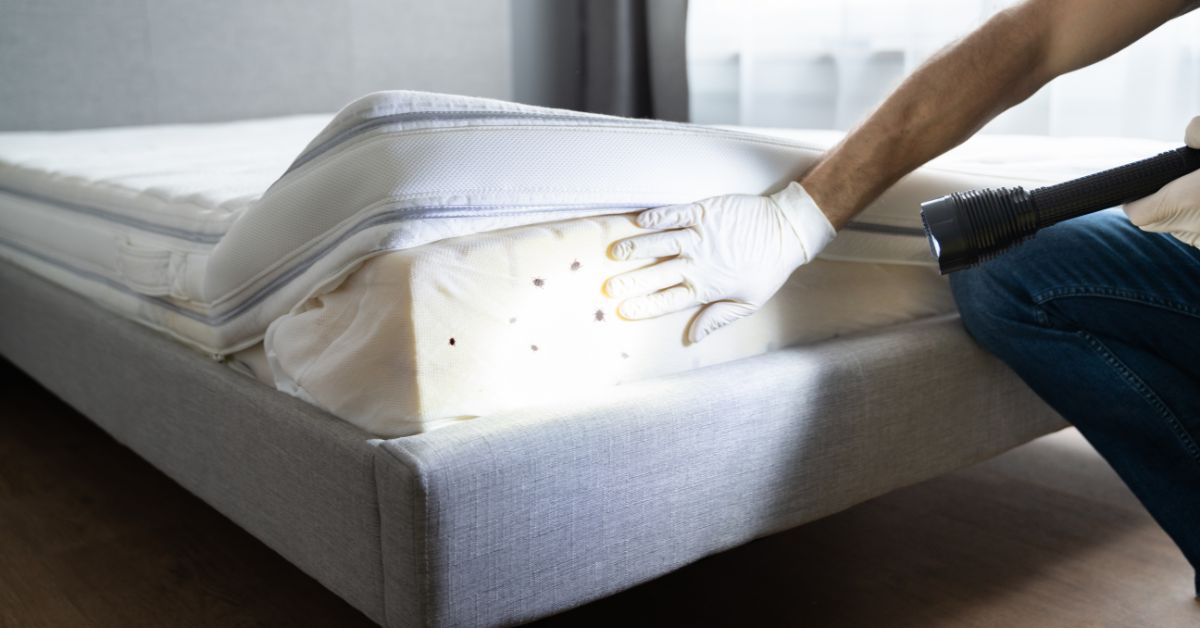
Physical Characteristics of Bed Bugs
Bed bugs are small, oval-shaped insects that are typically brownish in color. Adult bed bugs are about the size of an apple seed, measuring approximately 5-7 millimeters in length. They have flat bodies, which allow them to hide in tiny crevices and cracks. After feeding, their bodies swell and become a reddish color. It's important to note that bed bugs are often mistaken for other pests like carpet beetles or small cockroaches, but their distinct flat, oval shape and reddish-brown color set them apart.
Understanding the physical characteristics of bed bugs is crucial for effective identification. Unlike fleas, which have a more rounded body and can jump, bed bugs do not have wings and cannot fly. They move relatively slowly compared to other pests. Their nymphs, or young bed bugs, are smaller and lighter in color, making them harder to spot. However, with a keen eye and the right knowledge, you can distinguish bed bugs from other common pests and take appropriate action.
Common Hiding Spots in Hotel Rooms
When you first enter your hotel room, it's essential to conduct a thorough inspection for bed bugs. Start with the mattress seams, as bed bugs often hide in the folds and crevices. Lift the mattress and check the box spring, especially around the corners and edges. Headboards are another common hiding spot; use a flashlight to inspect the area where the headboard meets the wall. Bed bugs can also be found in furniture joints, behind picture frames, and inside electrical outlets.
Look for signs of infestation such as tiny blood spots on the sheets, which are a result of bed bugs being crushed after feeding. You might also find exoskeletons, which are the shed skins of bed bugs as they grow. Fecal matter, which appears as small, dark spots, is another telltale sign. If you notice any of these indicators, it's crucial to take immediate action to prevent the spread of bed bugs.
Using Tools and Gadgets for Detection
To enhance your bed bug detection efforts, consider using tools and gadgets designed for this purpose. A flashlight is indispensable for inspecting dark corners and crevices. A magnifying glass can help you spot tiny bed bug eggs and nymphs that are otherwise difficult to see with the naked eye. Bed bug detection kits are also available and can be a valuable resource. These kits often include adhesive traps that can be placed around the room to capture any wandering bed bugs.
In addition to traditional tools, there are modern gadgets and apps that can assist in identifying bed bugs. Some mobile apps allow you to upload photos of suspected bed bugs for expert analysis. There are also electronic devices that emit heat or carbon dioxide to attract and trap bed bugs. Utilizing these tools can provide peace of mind and ensure that you catch any potential infestations early.
Pre-Trip Preparations
Before embarking on your holiday travels, it's wise to take some pre-trip precautions to minimize the risk of encountering bed bugs. Start by researching hotel reviews online, specifically looking for any mentions of bed bug reports. Websites like Bed Bug Registry can provide valuable insights into recent infestations. Packing strategically can also help; use protective covers for your luggage and avoid placing your bags on the floor. Instead, use luggage racks or keep your bags in the bathroom, where bed bugs are less likely to hide.
Consider packing a small bed bug detection kit, including a flashlight and magnifying glass, to aid in your inspection efforts. Additionally, packing your clothes in sealable plastic bags can prevent bed bugs from hitching a ride home with you. These simple steps can significantly reduce your risk of bringing bed bugs into your home.
Inspection Upon Arrival
Upon arriving at your hotel, take a few minutes to inspect your room thoroughly. Start with the bed, checking the mattress seams, box spring, and headboard for any signs of bed bugs. Use a flashlight to examine the furniture, especially upholstered pieces. Don't forget to check behind picture frames and inside drawers. If you find any evidence of bed bugs, notify hotel management immediately and request a different room or a refund.
If you do find signs of bed bugs, it's important to act calmly and effectively. Document the infestation by taking photos and videos as evidence. This documentation can be useful if you need to report the issue to hotel management or relevant authorities. By conducting a thorough inspection and taking prompt action, you can prevent bed bugs from ruining your holiday.
During Your Stay
Even if your initial inspection doesn't reveal any bed bugs, it's wise to remain vigilant throughout your stay. Conduct daily inspections, paying close attention to the bed and surrounding areas. Keep your belongings safe by using luggage racks and storing your clothes in sealable plastic bags. Avoid placing your suitcase on the bed or floor, as these are common areas where bed bugs can hide.
If you notice any signs of bed bugs during your stay, take immediate action. Notify hotel management and request a room change or a refund. By staying proactive and vigilant, you can enjoy a worry-free holiday without the stress of dealing with bed bugs.
Immediate Actions
Discovering bed bugs in your hotel room can be alarming, but it's important to handle the situation calmly and effectively. First, avoid panicking and take a moment to assess the situation. If you find bed bugs, notify hotel management immediately and request a room change or a refund. Most hotels will be accommodating and take swift action to address the issue.
If a room change is offered, make sure to inspect the new room thoroughly before settling in. If a refund is provided, consider finding alternative accommodations. In either case, document the infestation by taking photos and videos as evidence. This documentation can be useful if you need to report the issue to relevant authorities or seek compensation.
Documenting the Infestation
Proper documentation is crucial when dealing with a bed bug infestation. Take clear photos and videos of the bed bugs, their hiding spots, and any signs of infestation such as blood spots or exoskeletons. This evidence can be helpful when reporting the issue to hotel management and relevant authorities. It can also support any claims for compensation or refunds.
In addition to visual documentation, keep a record of your communications with hotel management. Note the date and time of your report, the names of the staff members you spoke with, and any actions taken by the hotel. This information can be valuable if you need to escalate the issue or seek legal advice.
Post-Encounter Steps
After encountering bed bugs, it's essential to take steps to prevent them from coming home with you. Start by washing and drying all your clothes on high heat, as this will kill any bed bugs or eggs that may have hitched a ride. Inspect your luggage thoroughly, paying close attention to seams and pockets. Consider using a bed bug spray or treatment on your luggage to ensure no pests are hiding inside.
Before bringing your luggage into your home, inspect it again and treat it if necessary. Vacuum your suitcase and any other items that may have been exposed to bed bugs. By taking these precautions, you can minimize the risk of introducing bed bugs into your home and avoid a potential infestation.
Post-Trip Inspection
Once you return home from your trip, it's important to conduct a thorough inspection of your home and belongings. Start by inspecting your luggage and clothing for any signs of bed bugs. Pay close attention to seams, pockets, and zippers. Use a flashlight and magnifying glass to aid in your inspection. If you find any evidence of bed bugs, take immediate action to treat the affected items.
In addition to inspecting your belongings, check your home for any signs of bed bugs. Look for tiny blood spots on your sheets, exoskeletons, and fecal matter. Pay close attention to your mattress, box spring, and furniture. If you suspect an infestation, consider contacting a professional pest control service for a thorough inspection and treatment.
DIY Treatment Options
If you discover bed bugs in your home, there are several DIY treatment options you can consider. Start by washing and drying all your clothes and bedding on high heat. Vacuum your home thoroughly, paying close attention to cracks and crevices where bed bugs may hide. Use bed bug sprays and treatments available at your local hardware store to treat affected areas.
While DIY treatments can be effective, they may not always eliminate the infestation completely. If the problem persists, it's wise to consider professional pest control services. Pest control experts have the knowledge and tools to effectively treat bed bug infestations and prevent them from returning.
Preventative Measures
Preventing bed bug infestations requires regular home inspections and maintenance. Conduct routine inspections of your mattress, box spring, and furniture for any signs of bed bugs. Use protective covers for your mattress and pillows to create a barrier against bed bugs. Bed bug interceptors, which are placed under the legs of your bed, can also help detect and prevent infestations.
In addition to regular inspections, practice good hygiene and housekeeping habits. Reduce clutter in your home, as bed bugs often hide in piles of clothing and other items. Vacuum regularly and wash your bedding on a weekly basis. By staying vigilant and proactive, you can keep your home bed bug-free.
Advice from Pest Control Professionals
When it comes to dealing with bed bugs, expert advice can be invaluable. We reached out to pest control professionals for their best tips on preventing and treating bed bug infestations. According to experts, one of the most effective ways to prevent bed bugs is to conduct regular inspections and maintain a clean, clutter-free home. They also recommend using protective covers for your mattress and pillows, as well as bed bug interceptors to detect any potential infestations.
For those dealing with an existing infestation, experts advise seeking professional pest control services. DIY treatments can be effective for minor infestations, but professional services are often necessary for more severe cases. Pest control professionals have access to specialized tools and treatments that can eliminate bed bugs more effectively than over-the-counter products.
Useful Resources and Tools
There are several resources and tools available to help you prevent and treat bed bug infestations. Websites like Bed Bug Registry allow you to check for recent bed bug reports in hotels and other accommodations. Mobile apps can also assist in identifying bed bugs and tracking outbreaks. Some apps even allow you to upload photos for expert analysis.
In addition to online resources, consider investing in bed bug detection kits and treatment products. These kits often include adhesive traps, sprays, and other tools to help you detect and eliminate bed bugs. By utilizing these resources, you can stay informed and prepared to handle any bed bug encounters.
Additional Reading and Support
For those looking to learn more about bed bugs, there are several books, articles, and forums available. Books like "The Bed Bug Survival Guide" provide comprehensive information on identifying, preventing, and treating bed bug infestations. Online forums and support groups can also offer valuable insights and advice from others who have dealt with bed bugs.
If you need professional assistance, consider contacting Quality Pro Pest & Wildlife Services. Our team of experts is dedicated to providing effective pest control solutions to keep your home bed bug-free. today to learn more about our services and how we can help you prevent and treat bed bug infestations.
QualityPro Pest & Wildlife Services Knows How to Handle Bed Bugs
Don't let bed bugs ruin your holiday season. By following these tips and staying vigilant, you can enjoy a worry-free travel experience. If you encounter bed bugs or suspect an infestation in your home, Quality Pro Pest & Wildlife Services is here to help. Our team of experts is equipped with the knowledge and tools to effectively treat and prevent bed bug infestations. Contact us today to schedule an inspection and ensure your home remains bed bug-free.
Call QualityPro Pest & Wildlife Services now at (914) 877-3006 or send us a message online.

